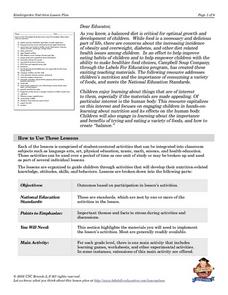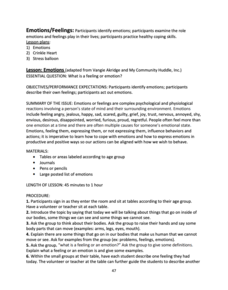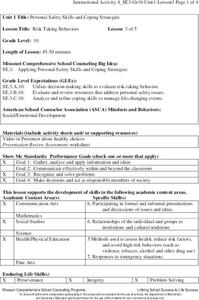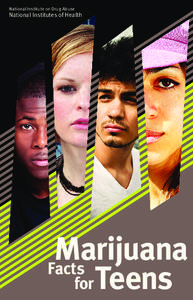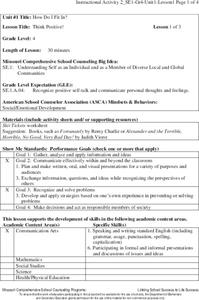Curated OER
Sometimes And All the Time Foods
Students utilize a picture of a lunch box and draw pictures of healthy food choices with which to fill it. The reasons for their choices of particular foods are discussed and the concepts of sometimes foods and all the time foods are...
Curated OER
A Balanced Diet
Students determine which healthy foods comprise a well balanced meal. Using a checklist, students classify foods as healthy or unhealthy. This lesson plan is intended for students acquiring English.
Curated OER
First Place Foods
First graders identify healthy foods. In this nutrition lesson plan, 1st graders create a Venn diagram to compare and contrast healthy foods. Students place foods in the proper circle.
Curated OER
The ABC's of Breakfast
Students identify the food group of various culturally diverse breakfast foods and discuss the importance of eating a healthy, well-balanced breakfast every morning. They then try different foods that begin with the letter A, B and C and...
Council for the Curriculum, Examinations and Assessment
Health and the Whole Person
Health is more than measuring your blood pressure and eating nutritious foods. Eighth graders discuss the factors that play into an individual's health, including spirituality, social life and friendships, emotional stability, cognitive...
Missouri Department of Elementary
What Are Bullying and Harassment? Part 2
After reviewing notes from the previous lessons, small groups obtain a scenario card that describes a situation in which bullying is happening. Peers discuss the event and brainstorm two solutions using the STAR method then present their...
Council for the Curriculum, Examinations and Assessment
Health and the Whole Person
To begin the second year of a health and wellness course, class members review the aspects of social, physical, emotional, cognitive, and spiritual health investigated the previous year. After completing the provided self-assessment...
Council for the Curriculum, Examinations and Assessment
Health and the Whole Person
The first lesson of the unit introduces class members to the social, physical, emotional, cognitive, and spiritual constituent elements of health and the need for balance among these elements. Class members used the provided assessment...
Nemours KidsHealth
Food Labels: Grades 3-5
Bring awareness to the ingredients scholars ingest daily with two lessons that look deeply into food labels. The first activity explores the difference between processed and fresh foods while the second activity focuses on sugar content.
Florida Department of Health
Understanding the Risk of Substance Abuse Unit
Teenage brains are different! Understanding that the teenage brain is still developing and thus more impacted by substance abuse is the key concept in a three-lesson high school health unit. Participants learn about how the brain and...
Safe Teens
Teen Game Plan
Don't let the teenagers in your class begin their life without a plan. A brief but inclusive booklet takes high schoolers thorough various aspects of their lives, including financial literacy, vaccinations, and sexual health, and lets...
Baylor College
Body Mass Index (BMI)
How do you calculate your Body Mass Index, and why is this information a valuable indicator of health? Class members discover not only what BMI is and practice calculating it using the height and weight of six fictitious individuals, but...
San Diego County District Attorney
Emotions/Feelings
Three lessons delve deep into the topic of feelings and the importance of expressing one's emotions. Through grand conversation, hands-on learning experiences, and reflective writing, scholars interpret the ups and downs of everyday...
Missouri Department of Elementary
To Give In or Not to Give In—That Is the Question!
No! A very simple word that can be very hard to say. Seventh graders have an opportunity to practice this difficult skill as they engage in a series of role-playing scenarios. As an exit ticket, 7th graders write a reflection on the...
Council for the Curriculum, Examinations and Assessment
Feelings and Emotions
The focus of the second in a 10-session course on Social, Physical, Emotional, Cognitive and Spiritual (SPECS) health is on learning to express and manage feelings appropriately. Class members learn different ways of identifying, coping...
Missouri Department of Elementary
Risk Taking Behaviors
Sophomores can be sometimes wise and sometimes foolish. The same can be said for their behaviors. After watching a presentation about risk taking behaviors, class members discuss the presentation in small groups, and then complete a...
Council for the Curriculum, Examinations and Assessment
Managing Change
Learning to embrace the opportunities and challenges change presents is the focus of the exercises and activities in this fifth session of a 10-lesson course on Social, Physical, Emotional, Cognitive and Spiritual (SPECS) health. The...
National Institute on Drug Abuse
Marijuana Facts for Teens
Is marijuana addictive? Can you drive under the influence of marijuana? What happens if you smoke marijuana while you're pregnant? Teenagers learn the answers to these and many more frequently asked questions in an online booklet about...
Missouri Department of Elementary
Think Positive!
Following an attention-grabbing read-aloud, scholars brainstorm ways they can change negative thoughts into positive thoughts. Small groups plan and perform a skit that showcases one of the new ideas to uplift one's feelings....
Missouri Department of Elementary
I’m Thumbody!
Positive and negative thinking is the focus of a lesson that boost self-awareness. Beginning with a whole-class discussion, scholars brainstorm what positive thinking looks and sounds like then compares and contrast the two types of...
Safe Kids Worldwide
Pedestrian Safety Lesson Plan
Distracted pedestrians? Yes. This lesson on pedestrian safety points out the dangers of texting and posting while walking around traffic. In addition, kids learn about safety resources available for those on foot.
Northern Ireland Curriculum
Self Concept
It may not be possible to have control over all aspects of life, but through the activities and discussions in this lesson class members learn different ways to cope with those areas over which they have little or no control.
Council for the Curriculum, Examinations and Assessment
Morals, Values, and Beliefs
What is integrity? What are the barriers that could keep a person from acting with integrity? How might these barriers be overcome? Class members tackle these questions as part of a course on Social, Physical, Emotional, Cognitive and...
Do2Learn
Dressing and Undressing Picture Cards
Create an inclusive living environment with help from picture cards detailing the step-by-step process of dressing and undressing.





